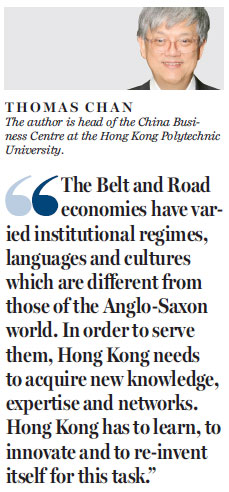HK must embrace Belt and Road Initiative
Updated: 2016-01-25 08:38
By Thomas Chan(HK Edition)
|
|||||||
Thomas Chan argues that government needs to be more proactive in maximizing the many benefits offered by the strategy
China has been promoting the Belt and Road Initiative since late 2013. It is a pity that the Hong Kong SAR has only started to capitalize on it with the Policy Address of the Chief Executive on Jan 13. Although it is better late than never, the policies proposed in the Policy Address seem to be more of a general nature. This indicates the government has not yet formulated a specific strategy to leverage on and support the central government's initiative.
There are of course specific measures recommended, like the tabling of a bill in December 2015 to the Legislative Council. The bill was on tax deductions for corporate treasury centers and treasury activities. This was in a bid to encourage more businesses to relocate their corporate treasury management to Hong Kong.
In addition, the government indicated it wanted to increase the number of offers under the existing Targeted Scholarship Scheme from 10 per year to about 100. It planned to do this in phases, with a new injection of HK$1 billion in funding support to extend the program to cover Belt and Road countries. This plan compares favorably with the 10,000 scholarships offered by the central government. But it is not clear how many years it will take to reach the target of 100 scholarships a year. We still cannot see enough determination and commitment of resources by the government to the Belt and Road strategy.
Perhaps the government is yet to formulate its overall strategy. This is the reason why the Policy Address states that the government will set up a steering committee for formulating strategies and policies - with the support of a Belt and Road Office. We probably have to wait for the meetings and work of the Belt and Road Steering Committee before knowing what the government will do.
The problem for Hong Kong with regard to the Belt and Road strategy is a lack of understanding by the local community and government - of the content, significance and implications of the central government's initiative. Because of this ignorance, the general attitude toward it (including the reaction to recommendations in the Policy Address) has been one of apathy at most.
We have not seen enough serious discussion, even in the local press or among academics, on how Hong Kong should participate in it. Instead there are suspicions and doubts about this central government initiative. These doubts will hinder the formulation and implementation of government strategies and policies. This will prevent the mobilization of the local business community and society to learn about and leverage the opportunities the Belt and Road offers Hong Kong.
What the Policy Address has said about the financial center functions of Hong Kong under the Belt and Road strategy reflects the views of the local financial sector. It is based on the conventional understanding of the institutional advantages of Hong Kong, such as its good legal regulations, availability of professional expertise and international standards. These have served the financial center of Hong Kong well - even without the Belt and Road strategy. But they do not specifically seem to be giving Hong Kong competitive advantages over Singapore and London for business coming from Belt and Road countries. This includes those related to the offshore renminbi market and services.
Hong Kong has mainly served the Anglo-Saxon part of the international system - and in recent years the mainland part as well. The Belt and Road markets have varied institutional regimes, languages and cultures which are different from those of the Anglo-Saxon world. In order to serve them, Hong Kong needs to acquire new knowledge, expertise and networks. Hong Kong has to learn, to innovate and to re-invent itself for this task. Attracting talented people from these countries by providing them with scholarships to study at local universities is a good start, but it will take a long time.
The Belt and Road strategy has already been up and running for more than two years. Many of the infrastructure projects will be completed in the next three to five years. So Hong Kong needs to acquire the necessary capabilities soon in order to catch up. A more effective way, perhaps, is to make use of the free port of Hong Kong to invite businesses and skilled people from these countries here. This could be done by reducing barriers and obstacles - like the waiving of tourist visas for residents of Russia and Kazakhstan - and the talent import program which originally targeted mainland residents. Hong Kong should change its priorities by inviting more businessmen and other professionals from Belt and Road economies to make it a truly open society and an international hub. This requires improving existing policies but incurs no additional public money. It thus dispenses with the need to get funding approval from the obstructing Legislative Council.
It is good to conduct roadshows to promote Hong Kong, but the best way, perhaps, is to invite people from these countries and regions to come to Hong Kong and network with companies and other professional people. The SAR government might need to coordinate policies to bring representatives from the Belt and Road countries to Hong Kong.
Other measures mentioned in the Policy Address like free trade agreements, investment protection and taxing agreements are the normal policies of a free trade port, with which Hong Kong has long been identified. But we have lagged behind for too long when it comes to improving them. Participation in the Belt and Road strategy could well be the catalyst that would quicken Hong Kong's pace to do what it should do but has not been doing for a long time.

(HK Edition 01/25/2016 page10)